

Month: December 2016
Welcome to the Busybird blog, where you can find helpful articles, updates, industry news and more. Make sure you stay up to date by signing up to our newsletter below.
Looking Forward
December 15, 2016Last night was Busybird’s Christmas Party/Open Mic Night 40 – a fantastic way to see out the year. In a night filled with merriment, feasting, and great readings, we also had the privilege of announcing the winner of the 2017 Busybird Creative Fellowship!
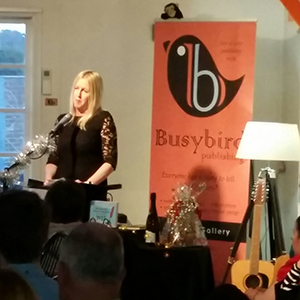
A resident of Kinglake, Maryanne experienced the tragedy of Black Saturday firsthand, and is interested in writing about how the aftermath of the fires affected the relationships of women in the Kinglake area. Throughout 2017, Maryanne will work with Busybird Publishing on developing both her writing and her project.
Thanks to everybody else who entered. Those who’ve been shortlisted also win a one-hour consult to talk to our Director of Publishing, Blaise, about their writing.
Now, tomorrow, Friday, 16th December 2016, Busybird Publishing closes for 2016!
We will be reopening Wednesday, 4th January 2017, at 9.00am.
Whilst we’re still programming our itinerary for 2017, there’s some things that we can tell you about already.
-
Open Mic Nic
- 15th February
- 15th March
- 19th April
- 17th May
- 21th June
- 19th July
- 16th August
- 20th September
- 18th October
- 15th November
- 13th December
- February 7th, 14th, 21st, 28th
- March 7th, 14th, 21st, 28th
- To be announced
- 5–7th May 2017
- To be announced
- Your book could be pulled from the market.
- There could be financial liability.
- Your reputation will be damaged, if not ruined.
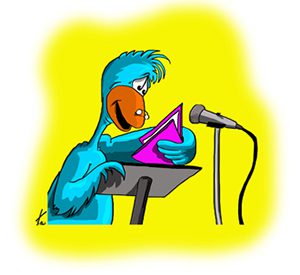 It’s back from February, the third Wednesday of every month (except December, when it’s the second Wednesday!), beginning at 7.00pm. If you’re a writer, poet, singer, stand up comic, mime – whatever your talent – and you want to try your material on a live audience, why not come on down? Or you might just want to come along and watch. It’s a fun, inexpensive night out. Great entertainment. Great company. Great fun.
It’s back from February, the third Wednesday of every month (except December, when it’s the second Wednesday!), beginning at 7.00pm. If you’re a writer, poet, singer, stand up comic, mime – whatever your talent – and you want to try your material on a live audience, why not come on down? Or you might just want to come along and watch. It’s a fun, inexpensive night out. Great entertainment. Great company. Great fun.
- Dates:
No bookings are required and it costs just $5.00 entry. Refreshments provided.
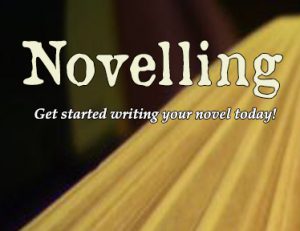 Ever wanted to write a novel but you’re unsure how to go about it? Or perhaps you’ve started a novel, but are getting stuck and don’t know where to take it. Novelling comprises eight 2.5-hour sessions that explore the facets of writing a novel – things such as structure, characterisation, arcs, plots, prose, causality, submitting, agents and publishers, and more!
Ever wanted to write a novel but you’re unsure how to go about it? Or perhaps you’ve started a novel, but are getting stuck and don’t know where to take it. Novelling comprises eight 2.5-hour sessions that explore the facets of writing a novel – things such as structure, characterisation, arcs, plots, prose, causality, submitting, agents and publishers, and more!
- Dates:
| Payment Options … | ||||||||||
| Plan | Cost | Total | ||||||||
| Early Bird Price | Pay by 1st Feb | $345 | ||||||||
| Pay as you go | $60 x 8 | $480 | ||||||||
| Two installments (First payment due by 1st Feb second due 1st March) |
$220 apiece | $440 | ||||||||
| One-time payment | $480 | $480 | ||||||||
If you’re interested, drop us an email or give us a call!
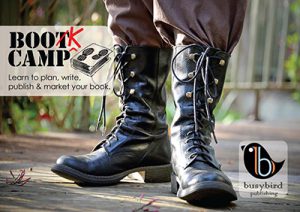 Learn about every facet of book production in this intensive all-day workshop. Blaise van Hecke – The Book Chick, and Busybird’s Director of Publishing – will teach you about planning your book, the methodology behind writing it, publishing options (self-publishing or traditional publishing, and the dangers of partnership publishing), and how to market your book. It’s everything you’d ever need to know about writing, publishing, and marketing, all packed into a single workshop! Book Camp runs 10.00am–4.00pm, and lunch is provided.
Learn about every facet of book production in this intensive all-day workshop. Blaise van Hecke – The Book Chick, and Busybird’s Director of Publishing – will teach you about planning your book, the methodology behind writing it, publishing options (self-publishing or traditional publishing, and the dangers of partnership publishing), and how to market your book. It’s everything you’d ever need to know about writing, publishing, and marketing, all packed into a single workshop! Book Camp runs 10.00am–4.00pm, and lunch is provided.
- Dates
Cost
Early Bird: $125.00
Normal Price: $165.00
Karma Kinglake Writing Retreat
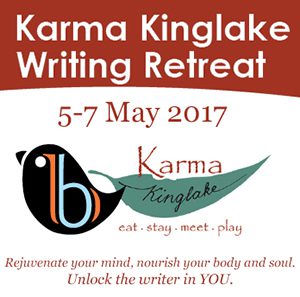 Take a break from your life and reinvigorate yourself in the beauty of Kinglake.
Take a break from your life and reinvigorate yourself in the beauty of Kinglake.
- Dates
Cost
Valued at $2,080, but costing just $1,250, and as an Early Bird special only $995 if you pay by 20th March. Check out our page for a breakdown of everything you get.
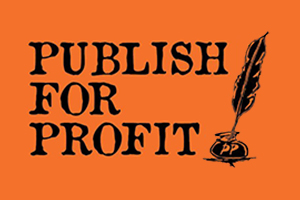 Want to meet other writers? Learn from their wisdom? Share your own knowledge? Perhaps you’re interested in networking? Publish for Profit is a regular meet-up that lets you do all this and also features brainstorming sessions, and a lesson on some facet of the publishing industry, e.g. editing, layout, distribution, writing blurbs, pitching articles (and on and on and on this list goes!).
Want to meet other writers? Learn from their wisdom? Share your own knowledge? Perhaps you’re interested in networking? Publish for Profit is a regular meet-up that lets you do all this and also features brainstorming sessions, and a lesson on some facet of the publishing industry, e.g. editing, layout, distribution, writing blurbs, pitching articles (and on and on and on this list goes!).
- Dates
Cost
$10.00 per meeting.
16-Week Write-to-Publish Program
 Have you been looking for intensive mentoring to guide you through the process of writing a book – planning it out, mapping the structure, writing it, editing it, and ultimately publishing it? Do you need somebody who’ll establish the parameters in which you can operate and challenge you to get the best out of yourself? Do you need somebody to make sure you stay on track? Busybird’s 16-Week Write-to-Publish Program is an intensive mentorship that will assign you a qualified mentor who’ll work with you to help you plan, write, and publish your book – whatever that book might be! We’ll be releasing more details in the new year, so keep an eye out for it!
Have you been looking for intensive mentoring to guide you through the process of writing a book – planning it out, mapping the structure, writing it, editing it, and ultimately publishing it? Do you need somebody who’ll establish the parameters in which you can operate and challenge you to get the best out of yourself? Do you need somebody to make sure you stay on track? Busybird’s 16-Week Write-to-Publish Program is an intensive mentorship that will assign you a qualified mentor who’ll work with you to help you plan, write, and publish your book – whatever that book might be! We’ll be releasing more details in the new year, so keep an eye out for it!
Our usual range of workshops will also be back, along with a few other surprises. But if you have any ideas for things you’d like to see Busybird run, email us here!
Hope you all have a great Christmas and a Happy New Year!
See you in 2017!
Top 10 Surefire Tips to Writing a Bestseller
December 8, 2016 This is my one hundredth Busybird blog since Busybird moved into our Montmorency Studio ~ Gallery.
This is my one hundredth Busybird blog since Busybird moved into our Montmorency Studio ~ Gallery.
I thought I’d do something special to commemorate the occasion.
Something that’s never been done on a publishing blog before.
I am now going to give to you the Top 10 Surefire Tips to Writing a Bestseller!
Here goes …
10. Find your own voice, and the process that works for you.
Don’t try to write like anybody else. Write the way only you you can write. Similarly, it’s great to soak up wisdom from other writers and to try things that they say works for them, but ultimately you need to find your own process. What works for me mightn’t necessarily work for you.
9. Don’t imitate.
Don’t write what’s in vogue because you think it’s going to sell. Write the story you want to write. It mightn’t be the most original story in the world – e.g. a love story, an epic fantasy – but it’s going to be your story, and the hook behind it is that it’s going to be the story only you can tell. So write your story, and write it your way.
8. Get your story out on the page.
Don’t worry about perfection first-up. Get a draft out on the page. Once you have it down, you then have something to work with. You can’t work with nothing.
7. Keep it justified.
If you have a convoluted structure, POV shifts, tense changes, or whatever the case may be, make sure they’re justified, rather than choices of whimsy. Choices of whimsy usually read as random and, well, amateurish. Be justified in your choices. Ask yourself why these shifts might occur. Otherwise, just keep it simple. Write in a straight line: the story starts here, moves forward, and ends there.
6. Write every day.
Writing is about momentum. The less you do it, the harder it is to stay enthused about it, to get back into it, to remember what you’re up to, and what you’ve already done. You’ll find you’re constantly rereading older chapters, trying to re-familiarize yourself with the story. The more you write, the easier it is to get back into, the more you look forward to doing it, and the more your story will open itself up to you.
5. Revise. Revise. Revise.
Don’t think your first draft is gold. Or that going over it once satisfies the demands of revision. The best writers revise constantly. Revise until you can get no more out of your piece. Then put it away for a while. Then take it out. Then revise, revise, revise. When you can get no more out of it, see the next step – but not before.
5. Get an external opinion.
Avoid family or friends or pets who’ll either tell you what you want to hear (‘Oh yeah, it’s totally awesome! Woof!’) or who’ll be destructive (‘Why’re you wasting your time?’). People need to be constructive in their criticism, and justified as to why they believe that criticism is warranted. Find somebody who can do this for you. This might be a manuscript assessor, an editor, a workshop group, a writing buddy, etc. Once this is done and you’ve made the changes required, go to the next step.
4. Revise. Revise. Revise.
Examine the feedback you’ve received. You don’t have to agree with all of it. If you don’t, make sure you’re not being precious. Have a valid rationale for why you disagree. But be brutally honest. Then revise. Revise until you can get nothing more out of it.
3. When submitting, be professional.
Observe submission guidelines. Don’t think you’re so brilliant that you can ignore them because you’ll wow them anyway. You won’t. You’ll piss them off. Do you really want to be a pisser-offer? If you’re rejected, don’t take it personally, even if the rejection isn’t very nice. Don’t think firing off an email suggesting they don’t know what they’re talking about, they missed the point, or they’ll regret the day they rejected you, is going to accomplish anything other than show your lack of professionalism. As an aside, lots of the people who work for these places talk (to one another). Get a bad reputation with one, and it’s likely to spread.
2. Grow a thick skin and learn to persevere.
This industry is subjective. There’s plenty of examples of books that have been rejected repeatedly, but picked up elsewhere and then gone on to be hits, and to win awards. So learn to take nothing personally, even if feedback seems personal, e.g. JK Rowling’s pseudonym, Raymond Galbraith, was told to join a writing class. Use it as a motivator. Persevere.
1. Do you really think there’s a formula for a bestseller?
Nope. Sorry. I fibbed. There really isn’t a formula. Don’t believe there is. What do you think this is – a wonderland? We hear lots of people say, ‘I have an idea for a book – it’s going to be a bestseller.’ Why? Multinational publishers – who are risk averse – only accept books they think they’ll be able to sell. They spend money marketing them. But that doesn’t guarantee success. That’s just the reality of the market. If there was a formula, or unfailing belief was enough, then everybody would be doing it. We just can’t know for sure. At the very best, all we can do is put ourselves out there. And that’s the key.
So keep writing. Keep pushing.
It’s the only way to give yourself any chance.
Be YOU
December 1, 2016 Something that always astonishes me is the disregard authors can have for copyright.
Something that always astonishes me is the disregard authors can have for copyright.
Here’s the simple reality: you can’t just take things from elsewhere and use them.
Why would you be able to do? Why should you be able to? How would you feel if somebody took a chunk of your book and started using it for their own benefit? Worse, how would you feel if they used it and they didn’t accredit you?
Let’s begin with song lyrics. No, no, no, no, no. You can’t just grab a couple of lines from a Rolling Stones’ song and use it. No. You can’t even take a couple of lines from some pub band’s song and use it. You have to get permission. Usually, this is from the artist or the record company. Just be warned: obtaining rights is usually time-consuming and expensive. (As an aside, all those websites on the net that post lyrics are actually in violation of copyright.)
How about images? You see something great on Facebook and grab it. It’s on the net, so you can use it, right? No. Somebody owns the rights to that image. Again, just because it’s on the net doesn’t mean it’s free to use. Similarly with diagrams, graphs, etc. Somebody’s put work into creating these. In all likelihood, they’ve created them to benefit from them, and not so you can reap the rewards.
Usually you’re okay quoting a small passage from an external source, as long as you accredit it (unless the author doesn’t want to be accredited). Usually. It can depend on how meritorious that passage is. You might be a Life Coach and want to use an exercise Tony Robbins has in his book – it’s just a tiny passage, no bigger than a paragraph. No problem. Right? Wrong. This is his intellectual property. Why should you profit from it? If people can get Tony Robbins’s exercise from you, you’re undercutting Tony Robbins. The problem here is you might take a passage and think you’re okay, but if the copyright holder objects, then you’re in trouble. I’ve had the Tony Robbins’ empire object to an author using one of his exercises; I’ve had another author object to one paragraph from his book being quoted.
Don’t think rejigging the sentence gives you ownership either. Consider this single sentence on the ‘Novel’ from Wikipedia (https://en.wikipedia.org/wiki/Novel):
- A novel is a long narrative, normally in prose, which describes fictional characters and events, usually in the form of a sequential story.
If I change it to this …
- Describing fictional characters and events, a novel is a long narrative, usually in prose and normally in the shape of a sequential story.
… I’m still plagiarising!
Also, if your book is an ebook (or going to become an ebook), Amazon performs an automatic check of the text, will report if it finds it duplicated elsewhere on the net, and will ask if you own the rights to the material. There’s examples where you might, e.g. your book might contain your blogs, or articles you’ve had published elsewhere. In this example, I don’t. My alternative is then to not publish, or to lie.
About the only time you don’t need copyright is when that copyright has expired – in Australia, usually 50–70 years after the authors’ death. Otherwise, if you’re using anything that’s not yours, SEEK PERMISSION. Most publishers will have somebody you can contact specifically for permissions. When all else fails, email whoever handles their general queries. Alternatively, most authors/artists can be found on social media. If it’s a case of some random image floating around and you can’t find out who owns it, bad luck. Don’t use it.
And don’t expect your editor or your publisher to identify what you can and can’t use either. This is your responsibility. A third party isn’t always going to be able to identify that you lifted several paragraphs from somebody else’s article or book, or that nifty bit of dialogue is actually a character quoting lyrics from some obscure grunge band’s song, or that the image you’re using on the title page of chapter 7 was lifted from some friend of a friend’s Facebook post.
This is up to YOU.
Trying to track these copyright-holders might be tedious and time-consuming, and in some cases it might even be costly, but consider the alternatives:
So is it worth it?
There mightn’t be a lot of original ideas left in the world. A love story is still just a love story. A disaster story is still a disaster story. A business book on growing your business is still just a business book on growing your business. A life-coach book on improving your life is still just a book on improving your life. Etc. These books – and more – saturate the market.
What’s original is YOU – how you write it, what you have to say, and where you take whatever you’re writing.
Remember that when you start writing.
